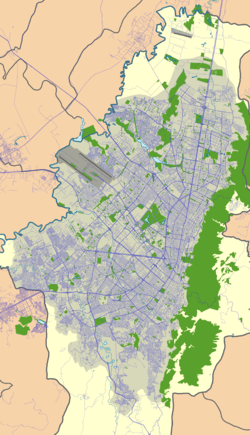Monserrate
| Monserrate Mountain | |
|---|---|
|
| |
| Highest point | |
| Elevation | 3,172 m (10,407 ft) |
| Coordinates | 4°36′21″N 74°3′23″W / 4.60583°N 74.05639°WCoordinates: 4°36′21″N 74°3′23″W / 4.60583°N 74.05639°W |
| Geography | |
 Monserrate Mountain Location within the Bogotá | |
| Location | Bogotá, Colombia |
| Country | Colombia |
| Region | Cundinamarca |
| Provinces | |
| Parent range | Andean Range |
Monserrate (after Catalan homonym mountain Montserrat) is a mountain that dominates the city center of Bogotá, the capital city of Colombia. It rises to 3,172 metres (10,407 ft) above the sea level, where there is a church (built in the 17th century) with a shrine, devoted to "El Señor Caído" (Fallen Lord).
The hill is a pilgrim destination, as well as a tourist attraction. In addition to the church, the summit contains restaurants, cafeteria, souvenir shops and many smaller tourist facilities. Monserrate can be accessed by aerial tramway, a funicular or by climbing, the preferred way of pilgrims.
All downtown Bogotá, south Bogotá and some sections of the north of the city are visible facing west, making it a popular destination for watching the sun set over the city.
History


The history of Monserrate can be considered to begin in the 1620 to 1630, where the Cofradia de la Vera Cruz (Brotherhood of Vera Cruz) began using the Monserrate's hill top, then known as the Snow hill top for religious celebration. As time passed, many devoted residents of Bogota began participating in the climb to the hill top, it wasn't until 1650 that four gentlemen met with the Archbishop as well as Juan de Borga the head of the Tribunal of Santafe in order to secure permission to build a small religious retreat on the mountain top. The founders of the retreat. The founders decided to establish the hermitage retreat in the name of Monserrat's Morena Virgin whose sanctuary was located in Catalonia, near Barcelona, giving the entire mountain the name Monserrate. Some people believe Montserrat was chosen to be the patron saint, due to one of the founders, Pedro Solis having an uncle whom had previously served as abbot in the Montserrat sanctuary.
By 1656 Father Rojas had been assigned management of the sanctuary ordered a carving of a crucifix and a statue of Jesus Christ after being taken off the cross, earning it the name" El Señor caido." Originally, these sculptures were placed inside a small chapel dedicated to the adoration of Christ instead of being placed inside the religious retreat itself. As time passed, more and more people began visiting the sanctuary in order to see the statue of Jesus, rather than the matron saint of Monserrat. By the 19th century, the "El Señor Caido" Statue had gained so much traction, that the Sculpture to the Virgin of Montserrat was removed from as the center piece of the sanctuary and replaced with "El Señor Caido" however, the mountain has retained the name Monserrate to this day. Ever since then, for more than four centuries, pilgrims and citizen have hiked the mountain to offer their prayers to the shrine of "El Señor Caido".
Both Monserrate and its neighbor Guadalupe Hill are icons of Bogota's cityscape.

Monserrate is also a place near Viana do Castelo, a town in the northern west of Portugal.
Funicular
- Hours[1]
- Monday to Friday: 7:00am to 11:45am
- Saturday: 7:00am to 4:00pm
- Sunday: 5:30am to 5:00pm
- Holidays: 6:30am to 11:45am
The Teleférico de Monserrate cable car
|
See also
References
- ↑ Como llegar (Spanish)
External links
| Wikimedia Commons has media related to Monserrate. |
- Cerro Monserrate
- Santuario Monserrate
- (English) Places To Go in Bogotá: Monserrate Mountain top information